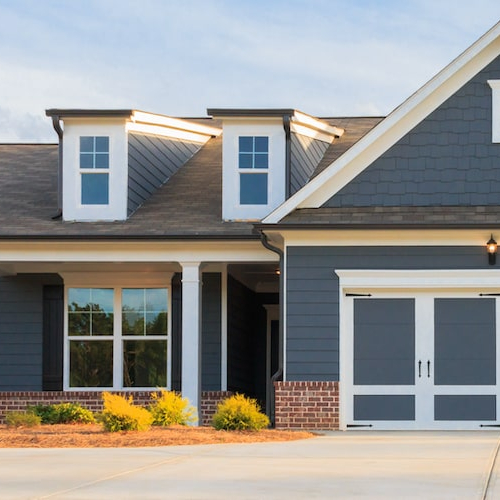What is a single-family home and is it right for you?
Dec 10, 2025
•6-minute read
When most people picture the classic American home, they imagine a single-family house with its own yard, driveway, and sense of privacy. It represents stability, comfort, and independence.
Understanding what defines a single-family home and the difference between this type of property and other housing options can help you decide whether it fits your lifestyle and long-term goals.
What is a single-family home?
A single-family home is a residence built for one household to live in as a single dwelling unit, meaning it functions as an independent living space without shared walls or shared utilities.
Most are single-family detached homes, which means they stand on their own lot without shared walls. These homes often have a private entrance, yard, and utilities that serve only that property.
The single-family detached home definition centers on independence and ownership. One structure belongs to one household on a single piece of land.
Some attached dwellings, such as townhouses, can also qualify if they are separated by a wall that extends from the ground to the roof and each unit operates on its own systems. What makes a home single-family is not just the design but its ability to function as a self-contained dwelling.
Are attached dwellings considered single-family homes?
Attached homes, such as townhouses can qualify as single-family properties when they meet certain separation requirements. Each unit must have its own foundation, utilities, and private entrance, even if it shares a wall with a neighboring home. In this setup, the homeowner owns both the structure and the land on which it sits.
This differs from accessory dwelling units (ADUs), which are secondary living spaces, such as basement apartments or backyard cottages, located on the same lot as a primary home.
Terms of ownership for a single-family house
When you buy a single-family house, you own both the building and the land it sits on. That includes outdoor areas such as the yard, driveway, and any detached structures.
This differs from condo ownership, where residents usually own only the interior of their unit and share exterior spaces and common areas. Single-family homeowners are responsible for their own utilities, maintenance, and direct street access, which gives them full control of their property.
A brief history of single-family homes
The single-family home became a defining part of American life after World War II. Families were growing, and people craved space, privacy, and a yard of their own. Builders created suburban neighborhoods to meet that demand.
According to the National Academies of Sciences, these preferences reflected cultural values around independence and prosperity. Local zoning rules, such as minimum lot sizes, reinforced that vision.
Over time, detached homes became the most common housing type in the United States. Researchers at the Harvard Joint Center for Housing Studies note that many cities are now revisiting those rules to expand access to affordable housing.
The pros and cons of single-family homes
Owning a single-family home offers the classic homeownership experience. This includes privacy, a yard, and flexibility to make most changes to the property. But it also comes with greater responsibility.
Considering the advantages and disadvantages can help you decide whether this type of property fits your needs.
Pros of single-family homes
- Plenty of space: Single-family homes often have multiple bedrooms, large kitchens, garages, or basements for storage. Families who need room to grow often find them ideal.
- Privacy: Without shared walls, you have more peace and quiet than in most attached dwellings.
- Freedom to build or modify: Owners can usually renovate or expand without seeking approval from neighbors or shared boards. However, many remodeling projects still require local permits for structural changes, plumbing, or electrical work to ensure compliance with safety codes and zoning regulations. Obtaining proper permits helps avoid fines and delays when selling the home later. For some buyers, taking on a fixer-upper is an opportunity to build equity and create a home that reflects their vision.
- Few rules: Some single-family homes are located in developments with homeowners associations (HOAs), while others are entirely independent. HOAs can set community standards, manage amenities, and charge fees, though their rules are often less restrictive than condo associations. Understanding whether your property is governed by an HOA – and what it covers – can help you plan for potential obligations and costs.
Cons of single-family homes
- High purchase price: Detached homes often cost more than condos or townhouses. This makes them harder for first-time buyers to afford. It helps to review first-time home buyer tips and explore tools such as the how much house can I afford calculator.
- High down payment and closing costs: Because single-family homes usually have higher prices, you will likely face larger upfront costs for the down payment and closing costs.
- Significant financial responsibility: All maintenance, taxes, and repairs are your responsibility. Unexpected expenses such as roof replacements or plumbing work can add up over time.
- Sole responsibility for maintenance: Homeowners must budget their time and money for tasks such as lawn care, seasonal maintenance, and repairs to keep the home in good condition.
Alternatives to single-family homes
If you’re trying to decide whether a single-family home is right for you, consider these other types of homes that may be a better fit.
- Multifamily homes: A multifamily home is a residential property with multiple units, allowing owners to live in one and rent out the others. this type of property is suited for buyers looking for an investment.
- Condominiums: Condos offer lower maintenance and shared amenities. Each unit has an individual owner, and all condo residents jointly own the common areas.
- Townhouses: A townhouse is a hybrid between a condo and a single-family home, providing both private ownership and community benefits.
- Modular homes: Modular homes are prefabricated. This means they are built in sections off-site and assembled on location. This makes them cost-efficient and customizable.
- Apartments: For those who value flexibility, most apartments provide rental options without long-term commitment.
Is a single-family home right for you?
Whether a single-family home is the right choice depends on your goals and financial readiness. It also comes down to how you prefer to live day to day.
Evaluate your lifestyle needs and long-term goals
Consider how you intend to use your space. A single-family home can be a rewarding investment if you want a yard for children, pets, or gardening, or if you value outdoor space and privacy.
Determine financial readiness
Because these homes typically cost more upfront, understanding your budget early is essential. Getting preapproved is a good way to help you determine what you can afford and show sellers that you are a serious buyer.
A stable income and an emergency fund make it easier to handle unexpected expenses as well as regular maintenance.
Types of mortgages
There are several types of mortgages available for single-family home buyers. Choosing the right loan depends on your budget, credit history, and long-term goals.
Conventional loans with fixed or adjustable rates are a good fit for buyers who have strong credit and steady income. Government-backed options such as FHA, VA, and USDA loans can make buying a home more achievable for those who qualify. For higher-priced properties, a jumbo loan may be the best choice since it covers amounts that exceed standard lending limits.
Preapproval process
Getting preapproved helps buyers understand their borrowing limits and stay focused on homes within their budget. The process typically requires a few key documents, including recent tax returns, W-2 forms, and valid identification.
Because preapprovals usually expire after about 60 days, buyers may need to renew if their home search takes longer. You can read more about how preapproval works in the Rocket Mortgage® guide to mortgage preapproval.
Closing costs and fees
Since single-family homes typically have higher purchase prices than condos or townhouses, buyers can expect closing costs to be slightly higher, often ranging from 3% to 6% of the loan amount.
These costs cover services including the appraisal, escrow management, title insurance, and property taxes. Saving funds for closing costs will help you stay on budget and avoid unexpected expenses.
The bottom line: Single-family homes can provide privacy and freedom
A single-family home offers space to grow, a sense of privacy, and the freedom to shape your living environment. It also requires greater financial commitment and regular upkeep. If that tradeoff feels right for your lifestyle, owning this type of home can be a long-term investment in comfort and stability.
When you’re ready to explore financing, start your journey with Rocket Mortgage and find a loan that supports your path to homeownership.

Sam Hawrylack
Samantha is a full-time personal finance and real estate writer with 5 years of experience. She has a Bachelor of Science in Finance and an MBA from West Chester University of Pennsylvania. She writes for publications like Rocket Mortgage, Bigger Pockets, Quicken Loans, Angi, Well Kept Wallet, Crediful, Clever Girl Finance, AllCards, InvestingAnswers, and many more.
Related resources

12-minute read
20 popular types of houses and home styles
We rounded up the most common types of houses and provided their key features, pros, cons and photos so you can find the home style that best fits you.
Read more
8-minute read
Buying an old house vs. a new house: The pros and cons
Debating between the freshness of a new house and the charm of an old house? We implore you to consider the financial differences before buying.
Read more
5-minute read
What is an accessory dwelling unit, or ADU?
An accessory dwelling unit is a separate living space located within your home or on your property. Find out more about ADUs and how one might work for you.<...
Read more